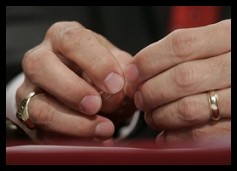*** Special to The BRAD BLOG
*** by D.C. Correspondent Margie Burns
 Today I sat in on the Senate Judiciary Committee hearing, “Department of Justice Oversight,” part of which Brad posted about, earlier. The solo witness was Attorney General Alberto Gonzales, covering some by-now familiar ground in the matter of those questionable firings of US Attorneys in seven of 93 districts. In spite of some repetitive questioning, primarily by Charles Schumer (D-NY), the day was actually enlightening.
Today I sat in on the Senate Judiciary Committee hearing, “Department of Justice Oversight,” part of which Brad posted about, earlier. The solo witness was Attorney General Alberto Gonzales, covering some by-now familiar ground in the matter of those questionable firings of US Attorneys in seven of 93 districts. In spite of some repetitive questioning, primarily by Charles Schumer (D-NY), the day was actually enlightening.
First, the hearing further indicated the direct White House connection suggested earlier by Brad. Gonzales is still in a position where he cannot speak freely about Bush, even if he wanted to do so. But even Gonzales’ measured and cautious answers to questions were revealing. Senator Patrick Leahy (D-VT), chair of Judiciary, led off by asking whether Gonzales had had any conversations about the US Attorneys with White House senior advisor Karl Rove. Answer: yes, in fall 2006 Gonzales had a conversation with Rove about USAs, regarding “voter fraud” in three districts – New Mexico, Milwaukee, and Philadelphia....
 Gonzales testified that that was his only conversation on the topic with Rove. Then, when Leahy followed up on the firing of apparently well-regarded US Attorney David Iglesias in New Mexico, Gonzales mentioned candidly that he had also had a meeting with Bush, in October 2006. “The president relayed to me similar concerns about the [same] three districts,” Gonzales said straightforwardly.
Gonzales testified that that was his only conversation on the topic with Rove. Then, when Leahy followed up on the firing of apparently well-regarded US Attorney David Iglesias in New Mexico, Gonzales mentioned candidly that he had also had a meeting with Bush, in October 2006. “The president relayed to me similar concerns about the [same] three districts,” Gonzales said straightforwardly.
Leahy’s question was when, exactly, Iglesias was added to the list, a blank Gonzales could fill in only partially: some time between Oct. 17 and Nov. 15, 2006. The working assumption here is that Gonzales in all probability does not know when Iglesias’ name was added, because he was not present at the time.
Actually, I think it pretty obvious by now that there was only so much the Attorney General knew, or was able to do, about that dread ‘list’ of attorneys on the proposed chopping block. He didn’t make it up. He didn’t have the power to control the personnel to make it up. He couldn’t control the list.
Why not? – Because the Attorney General and a few other individuals in the Justice Department have been little more than political-wing adjuncts of an over-politicized White House ever since January 21, 2001.
Clearly the Democrats on the Committee know it, too. – Schumer and Senator Dianne Feinstein (D-CA) used the occasion to hit Gonzales repeatedly on questions he could have answered easily, given either (1) the autonomy or (2) a willingness to jettison the Oval Office. Feinstein asked, for example --- and these would seem to be pretty fundamental inquiries, I have to say --
- Whose idea was it to change the law [amend the Patriot Act to allow the Attorney General to pick US Attorneys beyond the 120-day interim appointments previously allowed]? (Congress just reversed this change, BTW, so the firings have had one good effect.)
- Who was the ‘decider’ [on the firings]?
- You made the decision on the firings without ever looking at the performance evaluations? (Gonzales answered, “That is correct.”)
- How was this ‘list’ compiled?
Hey, good question. Kyle Sampson, Gonzales’ former chief of staff, testified previously that he “aggregated” information from others; Gonzales testified today that he turned the project over to Sampson, expecting that Sampson would receive input from 'senior' people in the DOJ including Deputy Attorney General Paul McNulty. Et cetera. (I remember trying to ask McNulty a question once, in a press conference about the 'war on terror' in front of the federal court in Alexandria, VA. Wish McNulty could have heard my question, but he all of a sudden came down with a sudden spurt or fit of temporary deafness and stood there making little hand motions in the general vicinity of his ears. I repeated it for him, too.)
Speaking of performance evaluations: regrettably, one misconception not cleared away by today’s hearing is that canard launched previously by a misdirected Washington Post article, that US Attorney Patrick J. Fitzgerald, Northern District of Illinois, was ‘ranked’ as ‘not distinguished’ in an ‘evaluation’ by Justice. We addressed this problematic report some weeks ago at BRAD BLOG, but Senator Dick Durbin (D-IL) returned to it today, asking Gonzales whether he was aware that there had been an ‘evaluation’ of Fitzgerald’s performance “shortly after you arrived” as Attorney General. – Gonzales answered, fairly enough, that he has since become aware of the reports but didn’t know at the time.
Gonzales testified that he does not recall ever having a conversation with/hearing from either Bush or Rove, about Fitzgerald. Durbin, who evidently still thinks that Fitzgerald was somehow ‘ranked’ ‘not distinguished,’ asked Gonzales point-blank, “Was that fair to Pat Fitzgerald?” Gonzales’ answer was fully to the point. Three points, in fact: first, he recused himself from matters involving the Special Prosecutor, given the delicate and sensitive Valerie Plame investigation; second, he would have thought it inappropriate to rank any US Attorney conducting that sensitive an investigation; and third, in Gonzales' opinion, “Fitzgerald is an outstanding prosecutor.”
(The Washington Post still has not corrected the misimpression it set loose around the world, has not replied to my inquiries on the topic, and has not apologized to readers. More on all that later. By coincidence, WaPo reporter Dan Eggen was among those seated at the press table with me today --- seems like a nice guy --- not looking jubilant when this line of questioning arose. Durbin and Eggen did not return to the hearing after lunch break. Maybe they spent part of the afternoon clarifying the chronology of that misguided ‘insider’ story. Meanwhile, it is making its way into gospel around the Chicago area, and even into legal cases. But more on that later, also.)
The quick moral of the hearing today, IMHO, is that Dems should pursue the malfeasance of the White House directly, without using the hapless Gonzales as a means to an end. Do not pass Go; do not try to go through Gonzales. Question the WH directly, do it firmly, and exact a promise from Charles “Chuck” Schumer that he will not talk for two years.
On the other hand, Senator Sheldon Whitehouse (D-RI) was good again, as he was last time. Whitehouse inquired about the definition of “improper reasons” for the firings used by both Sampson and Gonzales – that is, to interfere in a “particular” case. I have wondered about that question myself. As Whitehouse pointed out, with that definition, “you’ve set the bar way low for yourself.” Gonzales didn't dispute the point, and seemed to concur.
A couple of last points: among matters NOT made much of were the firings of Kevin Ryan of the Northern District of California, one of the seven, and of Thomas di Biagio of Maryland, one of the eight. (Remember when there were eight controversial firings?) By all accounts, that seems to be because those two firings were highly justified.
There was some mention of the possibly thousands of missing White House emails, and Gonzales said clearly that any Republican National Committee email accounts used for White House business would be, by law, "presidential records" and, thus, should be preserved.
I have some questions about big topics, relevant to the DoJ, that could possibly be illuminated by that mass of emails. I am going to be on Peter B. Collins’ radio show at 8:00 EST tonight. I hope to raise some avenues for inquiry if time permits.


 Sunday 'New Guy, Old Guy' Toons
Sunday 'New Guy, Old Guy' Toons Blowing Smoke.
Blowing Smoke. 'Green News Report' 5/6/25
'Green News Report' 5/6/25
 SCOTUS Weighs 'Disastrous' Public Funding of Religious Schools: 'BradCast' 5/7/25
SCOTUS Weighs 'Disastrous' Public Funding of Religious Schools: 'BradCast' 5/7/25 Trump Judge Blocks NC GOP Theft of 2024 Supreme Court Seat: 'BradCast' 5/6/25
Trump Judge Blocks NC GOP Theft of 2024 Supreme Court Seat: 'BradCast' 5/6/25 Prosecutors Quit After U.S Attny Strikes Deal With Felon Cop: 'BradCast' 5/5/25
Prosecutors Quit After U.S Attny Strikes Deal With Felon Cop: 'BradCast' 5/5/25 Sunday 'Good Buy, Dolly!' Toons
Sunday 'Good Buy, Dolly!' Toons Trump Losing Streak Continues into SECOND Hundred Days: 'BradCast' 5/1/25
Trump Losing Streak Continues into SECOND Hundred Days: 'BradCast' 5/1/25 'Green News Report' 5/1/25
'Green News Report' 5/1/25 100 Daze (w/ Digby and Driftglass): 'BradCast' 4/30/25
100 Daze (w/ Digby and Driftglass): 'BradCast' 4/30/25 Campaign to 'Impeach Trump Again' Gains Fresh Momentum: 'BradCast' 4/29/25
Campaign to 'Impeach Trump Again' Gains Fresh Momentum: 'BradCast' 4/29/25 And Then They Came for the Judges...: 'BradCast' 4/28/25
And Then They Came for the Judges...: 'BradCast' 4/28/25 Trump EPA Guts Enviro Justice Office: 'BradCast' 4/24/25
Trump EPA Guts Enviro Justice Office: 'BradCast' 4/24/25 Largest U.S. Broad-caster Hoaxes Viewers to Help Gut FCC Rules: 'BradCast' 4/23/25
Largest U.S. Broad-caster Hoaxes Viewers to Help Gut FCC Rules: 'BradCast' 4/23/25 FCC on Precipice of Ending All Limits on Corp. Control of Local TV Stations
FCC on Precipice of Ending All Limits on Corp. Control of Local TV Stations GOP Earth Day 2025 Hypocrisies and Dilemmas: 'BradCast' 4/22/25
GOP Earth Day 2025 Hypocrisies and Dilemmas: 'BradCast' 4/22/25 Pope Francis Dies, Trump Still Alive and Criming: 'BradCast' 4/21/25
Pope Francis Dies, Trump Still Alive and Criming: 'BradCast' 4/21/25
 VA GOP VOTER REG FRAUDSTER OFF HOOK
VA GOP VOTER REG FRAUDSTER OFF HOOK Criminal GOP Voter Registration Fraud Probe Expanding in VA
Criminal GOP Voter Registration Fraud Probe Expanding in VA DOJ PROBE SOUGHT AFTER VA ARREST
DOJ PROBE SOUGHT AFTER VA ARREST Arrest in VA: GOP Voter Reg Scandal Widens
Arrest in VA: GOP Voter Reg Scandal Widens ALL TOGETHER: ROVE, SPROUL, KOCHS, RNC
ALL TOGETHER: ROVE, SPROUL, KOCHS, RNC LATimes: RNC's 'Fired' Sproul Working for Repubs in 'as Many as 30 States'
LATimes: RNC's 'Fired' Sproul Working for Repubs in 'as Many as 30 States' 'Fired' Sproul Group 'Cloned', Still Working for Republicans in At Least 10 States
'Fired' Sproul Group 'Cloned', Still Working for Republicans in At Least 10 States FINALLY: FOX ON GOP REG FRAUD SCANDAL
FINALLY: FOX ON GOP REG FRAUD SCANDAL COLORADO FOLLOWS FLORIDA WITH GOP CRIMINAL INVESTIGATION
COLORADO FOLLOWS FLORIDA WITH GOP CRIMINAL INVESTIGATION CRIMINAL PROBE LAUNCHED INTO GOP VOTER REGISTRATION FRAUD SCANDAL IN FL
CRIMINAL PROBE LAUNCHED INTO GOP VOTER REGISTRATION FRAUD SCANDAL IN FL Brad Breaks PA Photo ID & GOP Registration Fraud Scandal News on Hartmann TV
Brad Breaks PA Photo ID & GOP Registration Fraud Scandal News on Hartmann TV  CAUGHT ON TAPE: COORDINATED NATIONWIDE GOP VOTER REG SCAM
CAUGHT ON TAPE: COORDINATED NATIONWIDE GOP VOTER REG SCAM CRIMINAL ELECTION FRAUD COMPLAINT FILED AGAINST GOP 'FRAUD' FIRM
CRIMINAL ELECTION FRAUD COMPLAINT FILED AGAINST GOP 'FRAUD' FIRM RICK SCOTT GETS ROLLED IN GOP REGISTRATION FRAUD SCANDAL
RICK SCOTT GETS ROLLED IN GOP REGISTRATION FRAUD SCANDAL VIDEO: Brad Breaks GOP Reg Fraud Scandal on Hartmann TV
VIDEO: Brad Breaks GOP Reg Fraud Scandal on Hartmann TV RNC FIRES NATIONAL VOTER REGISTRATION FIRM FOR FRAUD
RNC FIRES NATIONAL VOTER REGISTRATION FIRM FOR FRAUD EXCLUSIVE: Intvw w/ FL Official Who First Discovered GOP Reg Fraud
EXCLUSIVE: Intvw w/ FL Official Who First Discovered GOP Reg Fraud GOP REGISTRATION FRAUD FOUND IN FL
GOP REGISTRATION FRAUD FOUND IN FL

































